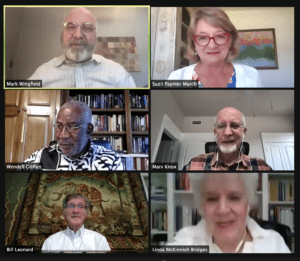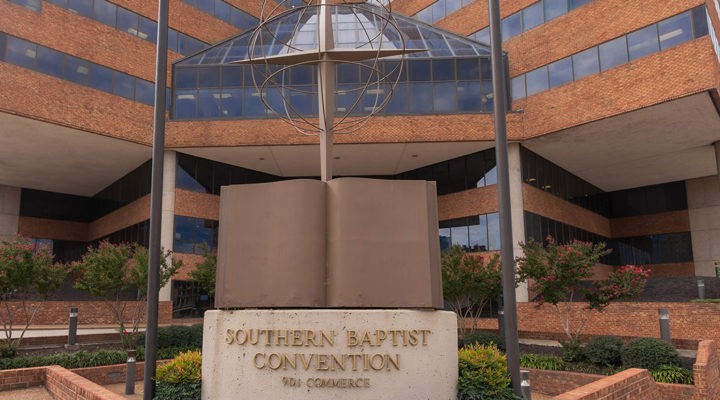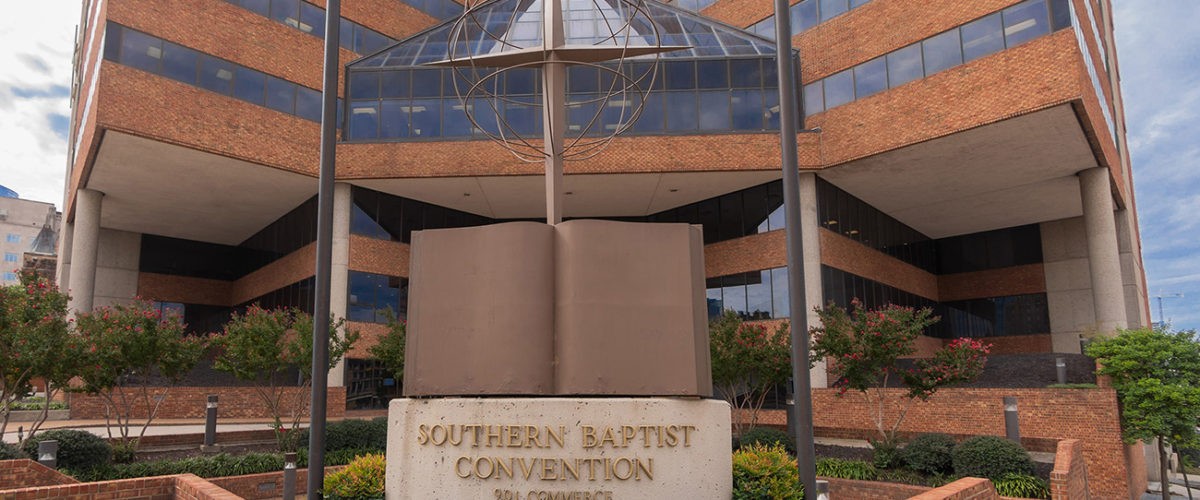The turmoil engulfing the Southern Baptist Convention over its handling of sexual abuse allegations, racial injustice and gender inequality are both a result and an expression of a mean-spirited religious impulse that also has divided the U.S. politically and culturally, Arkansas judge, pastor and civil rights advocate Wendell Griffen said during a June 13 webinar convened to preview the SBC’s annual meeting.
Recent claims that high-ranking convention officials sought to impede investigations into clergy sexual abuse allegations, the rejection of Critical Race Theory by denominational leaders, its continued adherence to the ideology of complementarianism and its part in fanning the flames of white Christian nationalism are manifestations of a faith-based toxicity that is not unique to the SBC or even to the U.S., Griffen said during the event hosted by Baptist News Global.
“We’re really talking about the heresy of hateful faith, which is a global phenomenon, whether you’re talking about (Prime Minister Narendra) Modi in India or whether you’re talking about the hateful faith of the Taliban, or you’re talking about the hateful faith of the SBC, or hateful things someplace else,” he said.
 Griffen was joined on the panel of notable SBC exiles by Bill Leonard, church historian and retired dean of the Wake Forest University School of Divinity; Suzii Paynter, former executive coordinator of the Cooperative Baptist Fellowship; Linda McKinnish Bridges, former president of Baptist Theological Seminary at Richmond; and Marv Knox, veteran Baptist journalist and leader.
Griffen was joined on the panel of notable SBC exiles by Bill Leonard, church historian and retired dean of the Wake Forest University School of Divinity; Suzii Paynter, former executive coordinator of the Cooperative Baptist Fellowship; Linda McKinnish Bridges, former president of Baptist Theological Seminary at Richmond; and Marv Knox, veteran Baptist journalist and leader.
BNG Executive Director Mark Wingfield, who formerly worked in and covered the convention, moderated the discussion, which addressed topics such as how the denomination’s pro-slavery founding shapes its present-day culture and practices, how fundamentalism contributes to modern divisions and how such trends are contributing to the denomination’s continued numerical decline.
Panelists also discussed the high-profile departure from the SBC of Russell Moore, former president of its Ethics and Religious Liberty Commission, and his more recent accusations about racism and sexual abuse concerns within the denomination.
Those who grew up Southern Baptist in the 20th century are all too familiar with the presence of controversy in the denomination, said McKinnish Bridges, referencing the ascendance and dominance of conservatism that resulted in the forced or voluntary exile of moderates and progressives from the SBC beginning in the 1980 and ’90s.
“Exile is a good thing — a place where you can see with a clarity that gives you the vision to that hateful faith,” she said.
She recalled a worried, whispered conversation among deacons in her church in 1963 about how to handle a Black person coming to worship and, a decade later, learning the congregation’s leadership would not sign her seminary recommendation form because its language said she would be preparing for ministry. They relented when the wording specified that she would work with children.
“Things have not changed. Been there, done that. We are seeing this again and again and again.”
Given current SBC leaders’ rejection of Critical Race Theory and the dogged adherence to complementarianism, it’s clear no real progress has been made, McKinnish Bridges said. “Things have not changed. Been there, done that. We are seeing this again and again and again.”
Nothing changes, Paynter said, because those attitudes are baked into the very DNA of the convention, which was founded in 1845 as a justification for slave ownership.
“The absolute commitment to defend slavery that was given wings by the institution of the SBC” was a precursor to the present-day “racism, misogyny, hatefulness toward other Christians and all the bickering,” she added.
The way Southern Baptists read, understand and teach the Bible also is shaped by that racist founding, which used Scripture to rationalize the ownership of other human beings, Leonard added. After the Civil War and the end of slavery, that approach was turned to support Jim Crow and segregation.
“The SBC says (to African Americans), ‘We want you but can’t take you fully because of the way we read the Bible.'”
The SBC never has been fully comfortable welcoming Black members because it is beholden to that scriptural doctrine and fears giving it up would result in surrendering other hard-held doctrines, including complementarianism, Leonard said. “The SBC says (to African Americans), ‘We want you but can’t take you fully because of the way we read the Bible. As long as that hermeneutic remains normative, then the Southern Baptist Convention in 2021 is going to be trapped in 1845.”
One of those traps springs from the way the convention defined sin at its founding, essentially limiting it to certain social behaviors such as drinking, dancing and fornication, Knox said. The goal was to omit slave ownership from the list of objectionable practices.
In the process, this made normative the mistreatment of other groups such as people of color, women, LGBTQ persons and even sex abuse victims, he explained. “When sin is so narrowly defined, then it doesn’t matter how you treat others.”
Leonard pointed to the hypocrisy of such a position: “Sexual immorality is inappropriate except for ministers whose churches cover it up.”
He recommended the denomination take a break from speaking out on race, gender and sexuality issues until it gets its own house in order. “You can’t go around telling people what to do about sexuality or race when you have permitted a lifestyle directly opposed to it.”
This all shows that toxic religion is nothing new, Griffen added. “Hateful faith is not generational or episodic. It is wicked in 2021 or 1845.”
“Hateful faith is not generational or episodic. It is wicked in 2021 or 1845.”
Wingfield said the convention’s history and trajectory — with moderates and progressives long gone — seems to have resulted in a battle now between conservatives and ultraconservatives for the heart of the denomination. Some even have recently labeled Russell Moore a liberal despite his history of adhering to a strictly conservative theology. He added that Southeastern Baptist Theological Seminary requires faculty and students to sign four statements of faith.
Wingfield asked panelists to discuss how that continuing rightward shift into narrowness affects the denomination overall.
Leonard said it has totally changed the witness of the SBC, which he said has abandoned “a heart-warming conversion experience” for a transactional process of creedalism by requiring signed confessions that declare belief in biblical inerrancy. “Their baptisms are declining in part because of demographics and in part due to a confusion as to the nature of conversion and absolute loyalty to a set of rigid dogmas.”
And without moderates to target, it’s natural for conservatives to begin to turn on themselves, he added. “Within fundamentalist circles, you’re always in danger of not being fundamentalist enough, and that’s what’s happening with this group. They’re going to probably have some sort of fissure or fragmentation.”
McKinnish Bridges said she experienced the pain of that creedalism when she learned there was no real role for her as a woman in the denomination. It was hammered home with the 1984 resolution on women that said as a woman, “you brought evil into the world and you cannot lead because you are the epitome of evil.”
Griffen said the doctrines and practices of the SBC amount to “a culture of dogma” and a heresy that is sending younger generations of Christians to other spaces which, in turn, makes it inconsequential who becomes SBC president this week or who wins the denominational wars.
“It doesn’t make any difference who is in charge,” he said. “If you’re on the Titanic, who the captain is doesn’t matter.”
Wingfield asked the panelists what they make of Moore’s departure from the SBC and his new appointment as a public theologian at Christianity Today. Given that Moore was a one-time opponent of CBF and of LGBTQ inclusion, can he be trusted?
McKinnish Bridges said she considers Moore to be “suspect” until he is away from SBC culture and spaces long enough to gain new perspectives.
According to Knox, Moore has staked out a courageous position on race and sexual abuse, which has taken “an enormous amount of moral courage.”
“If you’re fundamentalist, keep your bags packed.”
Either way, Leonard said, Moore is an example that no one is safe in fundamentalist circles. “You cross the line, and they will come for you. If you’re fundamentalist, keep your bags packed.”
Griffen instead described Moore’s situation as yet another beneficiary of white male privilege. “It’s unbiblical. After you have sinned, you go to the wilderness for reflection. He is not going to the wilderness. He is going to another pulpit.”
Meanwhile, any Southern Baptists with less than extreme-right leanings, as well as those Black pastors and churches that remain, are finding fewer and fewer footholds within the denomination, panelists said.
“I am sympathetic to the middle, but they don’t have much time,” Leonard said. “They can stay there and hunker down in the wilderness, but the wilderness is being overrun.”
He also drew a parallel to the current state of affairs in the Republican Party, which is consumed with battles between varying forms of conservatism and offers less and less space for those in the middle.
Both the struggles in the SBC and the Republican Party are driven by white Christian nationalism and include efforts to vilify opponents and impose authoritarian rule, Griffen said. “When you get fascism in power with the Cross of Christ, you have to have a crusade. You will find people to demonize, you will make yourself martyrs and declare yourselves on a holy war.”
Griffen added that many African Americans in the denomination are carefully considering their options in the current environment and will be watching closely to see what actions SBC messengers take on Critical Race Theory this week.
“Some Black pastors with SBC connections are really wrestling with if they should stay,” he said.
Paynter said she’s curious to see if the convention takes an even more rightward — and white supremacist — bent during the annual meeting.
Leonard predicted they will. “I think it’s going to get more fundamentalist. And Critical Race Theory is going to be more of a dividing point of who we are and who we are not.”
Related articles:
‘Southern Baptist whistleblower’ offers audio clips to back Russell Moore’s claims
Mike Stone and Ronnie Floyd should step down | Opinion by Maina Mwaura and David Phillips
Caring well? Speaker says Baptist Press reported abuse disclosure as a consensual affair
There’s controversy again, and more people are attending the SBC annual meeting


